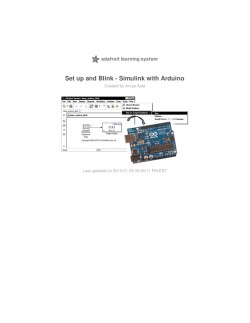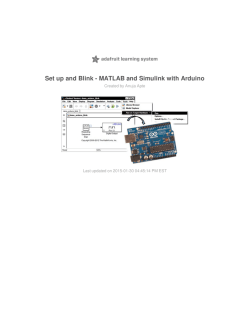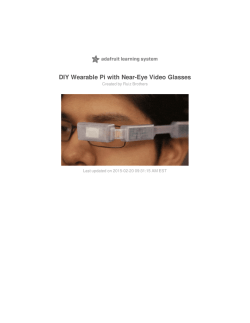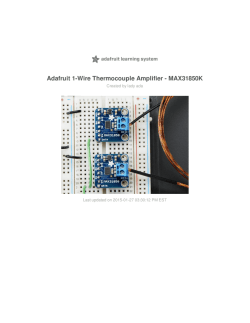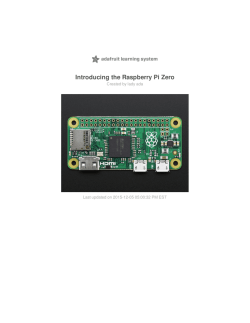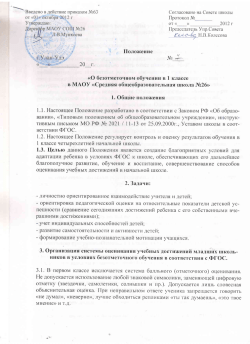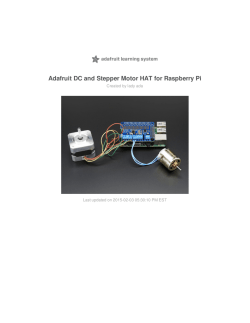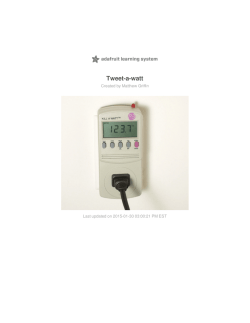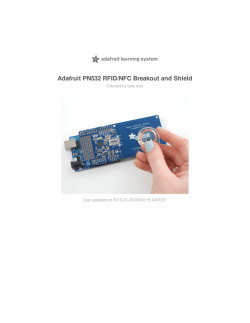
PDF - Adafruit Learning System
Adafruit FONA 808 Cellular + GPS Shield for Arduino Created by lady ada Last updated on 2016-02-22 11:47:24 AM EST Guide Contents Guide Contents Overview Pinouts Connectors Charging Circuitry SIM Connector LEDs Shield I/O Breakouts Audio Breakouts Other Breakout Pins Obtaining a SIM T-Mobile & TING Some suggestions from FONA users! Assembly Stack Alert! Attaching Header And Solder! 22 Attaching Antennas & Battery SIM Card Arduino Test Download Adafruit_FONA FONA 3G Baud Adjustment Load Demo Using the Test Sketch Hardware Test Network Test Audio Settings & Test PWM Buzzer Phone Calls SMS GPS (FONA808) © Adafruit Industries 2 4 9 10 11 12 13 14 16 16 18 18 19 21 21 21 https://learn.adafruit.com/adafruit-fona-808-cellular-plus-gps-shieldfor-arduino 23 24 27 27 27 27 31 32 33 34 35 36 37 38 Page 2 of 53 GPS Submodule (FONA 808 only) Raw NMEA out Handy Commands RI on SMS receipt Factory Reset FONA 808 vs FONA 800 F.A.Q.s Downloads Schematic Fabrication Print © Adafruit Industries https://learn.adafruit.com/adafruit-fona-808-cellular-plus-gps-shieldfor-arduino 38 39 42 42 42 43 47 51 52 52 Page 3 of 53 Overview Cellular + GPS tracking, all in one, for your Arduino? Oh yes! Introducing Adafruit FONA 808 GSM + GPS Shield, an all-in-one cellular phone module with that lets you add location-tracking, voice, text, SMS and data to your project, in Arduino shield format for easy use. © Adafruit Industries https://learn.adafruit.com/adafruit-fona-808-cellular-plus-gps-shieldfor-arduino Page 4 of 53 This shield fits right over your Arduino or compatible. At the heart is a powerful GSM cellular module (we use the latest SIM808) with integrated GPS. This module can do just about everything Quad-band 850/900/1800/1900MHz - connect onto any global GSM network with any 2G SIM (in the USA, T-Mobile is suggested) Fully-integrated GPS (MT3336 chipset (http://adafru.it/fhj) with -165 dBm tracking sensitivity) that can be controlled and query over the same serial port Make and receive voice calls using a headset or an external 32W speaker + electret microphone Send and receive SMS messages Send and receive GPRS data (TCP/IP, HTTP, etc.) PWM/Buzzer vibrational motor control AT command interface with "auto baud" detection Here's the GPS specifications: 22 tracking /66 acquisition channels GPS L1 C/A code Sensitivity Tracking: -165 dBm Cold starts : -147 dBm Time-To-First-Fix © Adafruit Industries https://learn.adafruit.com/adafruit-fona-808-cellular-plus-gps-shieldfor-arduino Page 5 of 53 Cold starts: 30s (typ.) Hot starts: 1s (typ.) Warm starts: 28s (typ.) Accuracy: approx 2.5 meters Sounds delicious, right? So we plated this fine module onto a shield with all the extras you need to make your next project shine Onboard LiPoly battery charging circuitry so you can take your project on the go. Use any 500mAh+ LiPoly or LiIon battery (http://adafru.it/dhK) and recharge via the Arduino when necessary. Two LEDs let you know when its charging and done. You can then flip the switch and use the battery to run your circuit! Standard 4-pole TRRS headphone jack. Use any 'Android' or 'iPhone'-compatible headset with mic (http://adafru.it/fbS) Breakouts for external 32W speaker and electret mic (http://adafru.it/fbU) if you don't want to use a headphone Level shifting circuitry to make it Arduino-safe Vibrational motor (buzzer) (http://adafru.it/fbV) driver so you can have noiseless notifications uFL connection for external passive GPS (http://adafru.it/fDi) & external GSM antenna (http://adafru.it/fbL) © Adafruit Industries https://learn.adafruit.com/adafruit-fona-808-cellular-plus-gps-shieldfor-arduino Page 6 of 53 Indicator LEDs for power and network connectivity Any standard 2G SIM slides into a secure connector (http://adafru.it/fbW) On its own, this shield can't do anything. It requires a microcontroller like an Arduino to drive it! You will also need some required accessories to make FONA work. These are not included! SIM Card! A 2G Mini SIM card is required to do anything on the cellular network. US AT&T no longer sells 2G SIMs and will shut off their 2G network, so for American customers we recommend any T-Mobile or reseller (TING, SIMPLE mobile, etc) that uses the T-Mobile network. (http://adafru.it/fbW) Lipoly Battery - 500mAh or larger! This 500mAh (http://adafru.it/drL)battery, or this 1200mAh (http://adafru.it/258) will work great. External GSM Antenna - This slim uFL antenna works great! (http://adafru.it/fbL) External Passive GPS Antenna - This 15mm passive antenna works great! (http://adafru.it/fDi) © Adafruit Industries https://learn.adafruit.com/adafruit-fona-808-cellular-plus-gps-shieldfor-arduino Page 7 of 53 Each order comes with one tested and assembled FONA shield and a stick of 0.1" male header. Required Arduino, SIM card, battery, antenna and other accessories are not included! Some light soldering is required to put the headers onto the shield. You can also grab some stacking headers if you would like to stack a shield on top (http://adafru.it/dsu) There's also some recommended accessories. They are not required but chances are you'll want them! TRRS 4-Pole Headset - Any 'iPhone' or 'Android' compatible (but not iPhone original) should work. We tried about 10 different ones, and basically the more expensive once are more comfortable and louder but our official iPhone headset mic did not work. (http://adafru.it/fbS) External Mic & Speaker - If you want to talk directly to your FONA, an electret mic (http://adafru.it/dDa) and mini 8 ohm speaker (http://adafru.it/dDb) will do quite nicely. Vibrating motor - the FONA can drive this directly, just solder a mini vibrating motor disc in! (http://adafru.it/dDc) © Adafruit Industries https://learn.adafruit.com/adafruit-fona-808-cellular-plus-gps-shieldfor-arduino Page 8 of 53 Pinouts There's a lot going on in this shield, we basically stuffed an entire phone in here! So lets go piece by piece on what you get in a shield © Adafruit Industries https://learn.adafruit.com/adafruit-fona-808-cellular-plus-gps-shieldfor-arduino Page 9 of 53 Connectors There's three external connectors along the left side, from the top, a headphone jack, a uFL connector and a 2 pin JST-PH. There's also a second uFL connector in the top middle. Headset jack - this is a 'standard' TRRS 3.5mm phone headset jack with stereo earphone and mono microphone. Any 'iPhone' or 'Android' compatible (but not iPhone original) should work. We tried about 10 different ones, and basically the more expensive once are more comfortable and louder but our official iPhone headset mic did not work for unknown reasons. Sleeve is Mic+, first ring is ground, then the second ring and tip are for stereo audio. The module does not have stereo out so we just tied both together. uFL RF connector - This is the Antenna connector, an antenna is required to use the FONA shield! You can either use a uFL GSM antenna like this (http://adafru.it/fbL), or use a uFL to SMA adapter (http://adafru.it/fbM) and then an SMA antenna (http://adafru.it/fbN) JST 2-pin - this is the battery input connector. It works with any of our Lipoly batteries but since the charge rate is 500mA (and the cellular module can spike high current draw!) we suggest our 500mAh (http://adafru.it/drL) or 1200mAh (http://adafru.it/258)batteries. You can also connect a JST cable here if you have other plans. uFL GPS connector - this is the GPS Antenna connector, an antenna is required if you want to © Adafruit Industries https://learn.adafruit.com/adafruit-fona-808-cellular-plus-gps-shieldfor-arduino Page 10 of 53 get GPS readings! You can use this 15mm passive antenna (http://adafru.it/2461), or any other passive 50 ohm antenna with a uFL connector. You cannot use an active antenna, although we have added some spots for optional bias circuitry, we couldn't get it to work with our active antennas so we left the pads there but not assembled. Charging Circuitry A lipoly battery is required to run the FONA shield, as there's up to 2A mini-spikes during cellular connectivity. To make it easy to keep the battery charged, there's charging circuitry onboard. The battery is kept topped-up by the 5V Arduino pin. We charge at a 200mA rate. You can check the status by looking at the CHRG and DONE LEDs. Charging occurs whenever the switch is set to CHRG You can also run the Arduino + Shield off the battery. It will run at a lower-than-5V level, around 3.7V or so. It's a under the common 5V voltage so if you are reading analog voltages and expecting 5V note that those numbers will be off, but for digital usages, it tends to be just fine. To run the Arduino+Shield off of LiPoly, set the switch to RUN © Adafruit Industries https://learn.adafruit.com/adafruit-fona-808-cellular-plus-gps-shieldfor-arduino Page 11 of 53 SIM Connector A 2G Mini SIM card is required to use the module. Nearly any cell phone shop can sell you a SIM card. It must be a 2G GSM card. AT&T in the US does not sell these anymore! They are shutting down their GSM network, and only T-mobile sells and supports a GSM network. If you are in another country, chances are you can just ask for a GSM 2G card. For USA customers, we have a knownworking TING SIM card which has a great billing system and works very well! (http://adafru.it/fbO) MicroSIMs won't fit - so make sure its a "Mini" SIM. Mini SIMs are 1" x 0.6" / 25mm x 15mm. These are by far the most common size. Most cards come with a voice and/or data plan. If you want to make phone calls and SMS's you'll need a voice plan. If you want to transmit data like fetching a webpage, you'll need a data plan. © Adafruit Industries https://learn.adafruit.com/adafruit-fona-808-cellular-plus-gps-shieldfor-arduino Page 12 of 53 LEDs PWR - green! Lit when the Cell module is booted and running NET - blue! You can use this for checking the current state without sending an AT command: 64ms on, 800ms off - the module is running but hasn't made connection to the cellular network yet 64ms on, 3 seconds off - the module has made contact with the cellular network and can send/receive voice and SMS 64ms on, 300ms off - the GPRS data connection you requested is active By watching the blinks you can get a visual feedback on whats going on. Charging - Orange! This is next to the JST jack. Indicates the onboard lipo charger is charging Done - Green! This is next to the JST jack. Indicates that the battery charging is done and the battery is full © Adafruit Industries https://learn.adafruit.com/adafruit-fona-808-cellular-plus-gps-shieldfor-arduino Page 13 of 53 Shield I/O Breakouts The most important pins are broken near the top left of the board. This is how the Arduino will communicate with the FONA shield! These pins are all 3-5V input safe and if they are an output, the logic level is whatever VCCIO is set to (see the VCCIO jumper near the FONA logo, by default we use 5V logic, for 3.3V logic-only Arduinos, cut the trace and solder the middle pad over to 3V Starting from the right RX & TX - The module uses UART to send and receive commands and data. These pins are auto-baud so whatever baud rate you send "AT" after reset or boot is the baud rate is used. RX is into the module connected by default to Digital #2, TX is out of the module, connected to Digital #3. Reset (RST)- this is module hard reset pin. By default it has a high pull-up (module not in reset). If you absolutely got the module in a bad space, toggle this pin low for 100ms to perform a hard reset. We tie this to Digital #4, and the library does a hard-reset so you always have a fresh setup. © Adafruit Industries https://learn.adafruit.com/adafruit-fona-808-cellular-plus-gps-shieldfor-arduino Page 14 of 53 RTS (Ready To Send) - This is the module's flow control pin, you can use this to control how fast data is sent out from the module to the Arduino, good when you want to read only a few bytes at a time. RI - this is the Ring Indicator. It is basically the 'interrupt' out pin from the module. It is by default high and will pulse low for 120ms when a call is received. It can also be configured to pulse when an SMS is received. This is not connected to any pin by default, so solder a wire if you want to use it! Net - this is the Network status pin. It pulses to signal the current status of the module. This is also tied to the Net LED so for more detail see the LEDs section Pwr - this is the Power Status pin. It is low when the module is off and high when the module has power. If you're using the Key button or pin, you can monitor this pad to see when the module's booted up. This is tied to the Pwr LED too. Key - This is the power on/off control for the module. Its also tied to the button in the top left. When this pin is tied to ground for 2 seconds, it turns the module on or off. It's not a level signal so it isn't like "low is off, high is on" - instead you must pulse it for 2 seconds to turn off/on. The module comes by default on (tied to GND) so the module will come up immediately. If by chance you want to control this pin, cut the GND-jumper right below this pad and use with any microcontroller output pin © Adafruit Industries https://learn.adafruit.com/adafruit-fona-808-cellular-plus-gps-shieldfor-arduino Page 15 of 53 Audio Breakouts SPK+ and - : This is for connecting an external 32 ohm speaker, max 0.2W. This is the same output as the headphone jack, but 'direct drive'. You cannot connect this to a stereo, powered speakers or other non-differential amplifier without adding a 100uF+ blocking cap in series to the + pin and then not using the - pin. Instead, your amp should use GND for the reference MIC + and -: this is for connecting an external electret microphone, it will bias the mic with 2V. Most electrets will work just fine. No extra circuitry is required for the mic such as a biaser or amplifier, just wire it up directly! Other Breakout Pins We scattered a few other breakouts around the board. Buzzer and PWM - These are tied to the PWM output of the module! The PWM capability is quite nice, it can set any frequency and duty cycle. The PWM pin is directly output from the © Adafruit Industries https://learn.adafruit.com/adafruit-fona-808-cellular-plus-gps-shieldfor-arduino Page 16 of 53 module and is 0-2.8Vpp. The Buzzer output has a NPN drive transistor so it can run a small vibration motor. Bz+ is the VBat voltage, Bz- is toggled on and off to ground. PPS - this it the 'pulse per second' output of the GPS. We didn't have space for a level shifter so this is a 0-2.8V signal, so you may not be able to read it on a 5V logic Arduino. However, if you really need it, you can shift it manually. © Adafruit Industries https://learn.adafruit.com/adafruit-fona-808-cellular-plus-gps-shieldfor-arduino Page 17 of 53 Obtaining a SIM In order to use the phone parts of FONA you will need a SIM card. Luckily, there's a phone store in every town in America! You can get a pre-paid or post-paid SIM but we kinda like the pre-paid kind. A 2G Mini SIM card is required to use the module. Nearly any cell phone shop can sell you a SIM card. It must be a 2G GSM card. AT&T in the US does not sell these anymore! They are shutting down their GSM network, and only T-mobile sells and supports a GSM network. If you are in another country, chances are you can just ask for a GSM 2G card. MicroSIMs won't fit - so make sure its a "Mini" SIM. Sometimes these are just called plain "SIM" cards since the huge-size SIMs are rarely used. Mini SIMs are 1" x 0.6" / 25mm x 15mm. these are by far the most common size. The only thing to watch for is you need to have a 2G GSM-compatible SIM In the US, AT&T no longer sells 2G SIMs! We suggest T-Mobile or T-Mobile "distributors" If you have an older AT&T SIM it may work. AT&T announced in 2012 that they would shut down their 2G network January 1, 2017. The vast majority of M2M (machine-to-machine) cellular devices use GSM, so the 5 year lead time was to give people plenty of time to migrate from AT&T. You can read an interesting whitepaper from Aeris about this below: AT&T 2G GSM Network Sunset Whitepaper http://adafru.it/dEh T-Mobile & TING T-Mobile does not have any announcement that they will sunset GSM. We can't speak for them but we expect at least 5 years warning as well, probably they will never fully sunset since there's millions of machines with GSM connectivity. © Adafruit Industries https://learn.adafruit.com/adafruit-fona-808-cellular-plus-gps-shieldfor-arduino Page 18 of 53 Adafruit now sells the TING SIM card, a 2G GSM SIM that works great with all FONAs, and has a great billing system as well, where you only pay what you use! If you don't want to use TING, there are dozens of T-Mobile resellers such as Walmart, SIMPLEMOBILE, etc! Just ask the seller if its AT&T or T-Mobile network. If they get cagey just say your apartment has no AT&T coverage. You do not need to bring in or show your FONA to the Cell Phone store. Just tell them you need a Mini SIM for a GSM phone and it's at home. Some suggestions from FONA users! I've had good luck using the FONA with a SIM from Walmart. Their 'Walmart Family Mobile' is a T-mobile reseller and you can pick up the SIM starter in store pretty easily (http://adafru.it/dEi). The service isn't the cheapest, it's $25 for the SIM and $30/month for unlimited talk+text or $40/month for unlimited talk+text+data but there's no contract as its all prepaid -tdicola Just want to let the Adafruit team know that it is possible to get pre-paided minutes on T-Mobile and its a pretty good deal. I was paying $100 for 1000 minutes (10c a minute 20 a sms) over © Adafruit Industries https://learn.adafruit.com/adafruit-fona-808-cellular-plus-gps-shieldfor-arduino Page 19 of 53 the course of the year. (http://adafru.it/dEj) For me it in my usage came out to about $8 a month. Have found this is something that you have to ask for at the store. No evidence in advertising or website -Paul B. Telna has a good deal you may want to point people to for FONA. I used them for a previous GSM project and they worked great. $20 per year, includes 1000 free txt messages and a bunch of other nice features. (http://adafru.it/dEk)I had a lot more issues with T-Mobile (Their cards go inactive if not used in a month and you have to call to reactivate) -Tyler C. I pay 2 EUR (a bit less than $3 USD) for 2 hours, unlimited SMS and 50Mb of Data at http://mobile.free.fr/ (http://adafru.it/dEr) -KTOWN There are specialty "machine 2 machine" SIM sellers that have plans that are tuned for the short bursts of usage used by these kinds of modules. Check out these guys (http://adafru.it/dEA) for example, you can choose data, voice/sms or a combination for a pretty low price! Hi, just a update to let you know I have just begun to use the Fona, SIM from ROGERS, which is 2G, 3G, ang 4G. I pulled my sim out of my phone, and it works well. So if you have Canadians that want to use that product, let them know it works on the west coast ! You can go to Rogers website and see the coverage map and services. - Steve C We haven't tried all of these SIMs so you may need to try it out. For other countries, GSM is very common so you should be able to buy a SIM from any cell phone store. © Adafruit Industries https://learn.adafruit.com/adafruit-fona-808-cellular-plus-gps-shieldfor-arduino Page 20 of 53 Assembly Stack Alert! If you want to stack a shield on top of the FONA Shield, you'll want to pick up some stacking headers and use those instead of the plain header shown here! Wanna stack? This tutorial shows how to use the plain header to connect to an Arduino. If you want to use stacking headers (http://adafru.it/dsu), don't follow these steps! Attaching Header Begin by breaking the 36-pin male header into four pieces: one 10-pin, two 8-pin and one 6-pin. Stick the header into the Arduino sockets with the long pins down. Place the shield on top so that all the little pins stick out through the matching holes in the shield. It should match up perfectly! (These photos show a FONA 800 shield, but the overall process is identical for the FONA 808) © Adafruit Industries https://learn.adafruit.com/adafruit-fona-808-cellular-plus-gps-shieldfor-arduino Page 21 of 53 And Solder! Be sure to solder all pins for reliable electrical contact. (For tips on soldering, be sure to check out our Guide to Excellent Soldering (http://adafru.it/aTk)). You're done! Check your solder joints visually and continue onto the next steps © Adafruit Industries https://learn.adafruit.com/adafruit-fona-808-cellular-plus-gps-shieldfor-arduino Page 22 of 53 Attaching Antennas & Battery A battery and GSM antenna is required to use the Cellular module. If you want to use GPS as well, a passive GPS antenna is also required Check polarity for the battery! Snap the uFL connector on, it will click when placed properly SIM Card You must insert a SIM card to do anything but the most basic tests. The shield and GPS does work without a SIM but of course you cannot send or receive texts, calls, etc! © Adafruit Industries https://learn.adafruit.com/adafruit-fona-808-cellular-plus-gps-shieldfor-arduino Page 23 of 53 The SIM card holder it on the right side of the shield. It holds a very-standard "Mini SIM" Micro SIMs will not work! Make sure you get a "Mini SIM" Open by sliding the cover towards the bottom of the shield Insert the SIM with the gold pads facing up and the notch on the outer corner Close the hinge down and slide the cover to lock it in place © Adafruit Industries https://learn.adafruit.com/adafruit-fona-808-cellular-plus-gps-shieldfor-arduino Page 24 of 53 The SIM should be secure and flat in the holder © Adafruit Industries https://learn.adafruit.com/adafruit-fona-808-cellular-plus-gps-shieldfor-arduino Page 25 of 53 Arduino Test The FONA library is under heavy development! This page may change over time! Download Adafruit_FONA To begin reading sensor data, you will need to download Adafruit_FONA Library from our github repository (http://adafru.it/dDC). You can do that by visiting the github repo and manually downloading or, easier, just click this button to download the zip Download the Adafruit_FONA Library http://adafru.it/dDD Rename the uncompressed folder Adafruit_FONA and check that the Adafruit_FONA folder contains Adafruit_FONA.cpp and Adafruit_FONA.h Place the Adafruit_FONA library folder your arduinosketchfolder/libraries/ folder. You may need to create the libraries subfolder if its your first library. Restart the IDE. We also have a great tutorial on Arduino library installation at: http://learn.adafruit.com/adafruit-all-about-arduino-libraries-install-use (http://adafru.it/aYM) FONA 3G Baud Adjustment If you have a FONA 3G, the first time you use it you may need to run the FONA3G_setBaud example to set the baud rate manually to 4800bps rather than 115200 Load Demo Open up File->Examples->Adafruit_FONA->FONAtest and upload to your Arduino wired up to the module. For Mega, Leonardo, or Micro, change the definition of FONA_TX to the pin you used! © Adafruit Industries https://learn.adafruit.com/adafruit-fona-808-cellular-plus-gps-shieldfor-arduino Page 26 of 53 Make sure you have a charged 3.7/4.2V LiPoly or LiIon battery plugged into the JST and an antenna attached © Adafruit Industries https://learn.adafruit.com/adafruit-fona-808-cellular-plus-gps-shieldfor-arduino Page 27 of 53 © Adafruit Industries https://learn.adafruit.com/adafruit-fona-808-cellular-plus-gps-shieldfor-arduino Page 28 of 53 Once uploaded to your Arduino, open up the serial console at 115200 baud speed to begin the tester sketch © Adafruit Industries https://learn.adafruit.com/adafruit-fona-808-cellular-plus-gps-shieldfor-arduino Page 29 of 53 Make sure you also have Both NL & CR for the serial command sender option. This means when you send data to the Arduino via the console, it will put a newline/return at the end. Using the Test Sketch The test sketch has a menu interface so you can test out just about everything the FONA can do. The menu may change slightly as we add more functionality and update code! Continue onto the next few sections to see what functionality you can test with the sketch © Adafruit Industries https://learn.adafruit.com/adafruit-fona-808-cellular-plus-gps-shieldfor-arduino Page 30 of 53 Hardware Test © Adafruit Industries https://learn.adafruit.com/adafruit-fona-808-cellular-plus-gps-shieldfor-arduino Page 31 of 53 Network Test © Adafruit Industries https://learn.adafruit.com/adafruit-fona-808-cellular-plus-gps-shieldfor-arduino Page 32 of 53 Audio Settings & Test © Adafruit Industries https://learn.adafruit.com/adafruit-fona-808-cellular-plus-gps-shieldfor-arduino Page 33 of 53 PWM Buzzer © Adafruit Industries https://learn.adafruit.com/adafruit-fona-808-cellular-plus-gps-shieldfor-arduino Page 34 of 53 Phone Calls © Adafruit Industries https://learn.adafruit.com/adafruit-fona-808-cellular-plus-gps-shieldfor-arduino Page 35 of 53 SMS © Adafruit Industries https://learn.adafruit.com/adafruit-fona-808-cellular-plus-gps-shieldfor-arduino Page 36 of 53 GPS (FONA808) GPS Submodule (FONA 808 only) The FONA 808 has a built in GPS module, you can use it for locating yourself in space! You will need to attach a GPS antenna to the uFL connector and make sure the GPS antenna is outside and pointing up to towards the sky Make sure to use a PASSIVE GPS antenna! You can start out by turning on the GPS module with O (capital-o) and query the status of the 'fix' with x. It will take a minute or two to get a fix. On FONA808 v1's the commands follow the AT+CGPSxxx pattern, on the v2's the commands are similar but look like AT+CGNSxxx Once you have a fix you can query and get the location/time data with L © Adafruit Industries https://learn.adafruit.com/adafruit-fona-808-cellular-plus-gps-shieldfor-arduino Page 37 of 53 The data is in a comma-seperated format: 0,4043.576433,7400.316980,58.647405,20150601201258.000,64,12,0.548363,100.442406 Can be parsed out to: 0 - this is the mode (will be 0) 4043.576433 - this is the longitude 7400.316980 - this is the latitude People often get confused because the GPS is working but is "5 miles off" - this is because they are not parsing the lat/long data correctly. Despite appearances, the geolocation data is NOT in decimal degrees. It is in degrees and minutes in the following format: Latitude: DDMM.MMMM (The first two characters are the degrees.) Longitude: DDDMM.MMMM (The first three characters are the degrees.) 58.647405 - this is the altitude in meters 20150601201258.000 - this is the UTC time in yyymmddHHMMSS.ms format. E.g. this is year 2015, month 06, date 01, 20 hour, 12 minute, 58 seconds. If you are not in UTC timezone you'll have to adjust this for your local time 64 - is the ttff, time to first fix, in seconds 12 - is the # of visible satelites 0.548363 - is the speed (in knots) 100.442406 - this is the best guess for 'course', e.g. which way you are heading, with 0 being 'north' and 180 being 'south' (we think) Raw NMEA out If you want to get the 'raw NMEA' data for some reason, you can do that with E On V1 FONA808's you can send a number from 0-255 indicating which sentences you want emittted. 0 for disable output © Adafruit Industries https://learn.adafruit.com/adafruit-fona-808-cellular-plus-gps-shieldfor-arduino Page 38 of 53 +2 for $GPGGA +4 for $GPGLL +8 for $GPGSA +16 for $GPGSV +32 for $GPRMC +64 for $GPVTG +128 for GPZDA e.g. if you want to see GPRMC and GPGGA, add +32 and +2 = 34 and put in that number. Then you'll see the data stream out at 1Hz On V2 FONA's you can only select 'on' or 'off' and get all sentences! When done, you can type in E and 0 instead, which will turn off the output © Adafruit Industries https://learn.adafruit.com/adafruit-fona-808-cellular-plus-gps-shieldfor-arduino Page 39 of 53 © Adafruit Industries https://learn.adafruit.com/adafruit-fona-808-cellular-plus-gps-shieldfor-arduino Page 40 of 53 Handy Commands Here's a quick list of useful commands that may not be directly supported by the library but are handy for many projects! RI on SMS receipt AT+CFGRI=1 The RI pin will pulse low for ~100ms when an SMS is received Factory Reset ATZ will reset the FONA GSM module to its factory default © Adafruit Industries https://learn.adafruit.com/adafruit-fona-808-cellular-plus-gps-shieldfor-arduino Page 41 of 53 FONA 808 vs FONA 800 We have two different types of GSM modules & shields under the FONA brand name. The FONA 800 (GSM/GPRS) © Adafruit Industries https://learn.adafruit.com/adafruit-fona-808-cellular-plus-gps-shieldfor-arduino Page 42 of 53 and the FONA 808 (GSM/GPRS + GPS too) © Adafruit Industries https://learn.adafruit.com/adafruit-fona-808-cellular-plus-gps-shieldfor-arduino Page 43 of 53 © Adafruit Industries https://learn.adafruit.com/adafruit-fona-808-cellular-plus-gps-shieldfor-arduino Page 44 of 53 Here's the key similarities Both Both Both Both Both Both have a 2G GSM/GPRS cellular core can do voice, data, text require a LiPoly battery and GSM antenna can use a 3.5mm headset recharge over the microUSB jack have a buzzer driver Here's key differences Size: the SIM808 based FONA breakout is larger. Shields are the same size The 808 has a GPS module integrated as well The 800 has external 8 ohm speaker driver (external audio) whereas the 808 has only headset audio and 32 ohm speaker driver The 800 has an FM tuner for listening to radio © Adafruit Industries https://learn.adafruit.com/adafruit-fona-808-cellular-plus-gps-shieldfor-arduino Page 45 of 53 F.A.Q.s Ahh! My FONA was working fine then I sent it some command and its not working right anymore? You can always factory reset the FONA by sending it the ATZ command. If you set an odd fixed baud rate (e.g. you cannot even get an OK when you send AT), a USB serial console cable will be helpful it quickly changing baud rates in your terminal software to get back to a working AT/OK setup! I'm using FONA as a voice caller and the other person can't hear me! Note that you do have to use a compatible headset. Not all CTIA headsets will work, the ones we have in the shop are known to work (http://adafru.it/fbK) and so do many other Android but iPhone headsets do not. You can also use 'external' audio on the FONA (electret mic and speaker soldered to FONA) but you cannot mix and match. Either you use headset or you use external audio. You cant use external mic and headset speaker. You also have to tell the FONA which audio you are using, it does not autodetect. You can use our library and fona.setAudio() (http://adafru.it/j0e) Is a Lipo Battery required? Can I run the FONA off of a power supply or just the microUSB port? The microUSB is only used to charge the battery. Without a battery installed it will flicker on and off so it cannot be used to power a FONA minus battery. You can power the FONA directly with 3.4V-4.4V voltage level. Its an odd voltage range (doesn't cover the common 3.3 or 5V) If you want to do that, apply that voltage to VBat and do not plug anything into the microUSB port. Can I charge the battery and use FONA at the same time? Yes! You can use the Lipoly as sort of a 'backup battery' - keep charging it via MicroUSB during use. If the MicroUSB loses power, the FONA will keep going. My FONA won't turn on/respond! Or it acts flakey and auto-shuts off sometimes! We've noticed a lot of problems that are 'weird' that are a results of using batteries with the wrong polarity. All batteries from adafruit have the right wire colors/polarity for the FONA Batteries not from Adafruit are not guaranteed to have the right pinout! Using the wrong pinout may damage the FONA and/or make it act 'odd'! FONA 800/808 requires a 2G SIM, does it work with a dual 2G-3G SIM? That will work fine, as long as the SIM can register to the 2G network at all, it is acceptable to use Are you sure I can't use ATT for 2G service? I'm in a T-Mobile cold spot © Adafruit Industries https://learn.adafruit.com/adafruit-fona-808-cellular-plus-gps-shieldfor-arduino Page 46 of 53 The AT&T GSM network is going to be live until January 2017. If you're reading this and it's 2017, you're outta luck. If not, you can try to get an AT&T SIM activated to the 2G GSM network but its not going to do that by default. You'll have to call up or talk to an AT&T rep and it may not go so well because they really don't want people to use their GSM network. You can also call up T-Mobile and say you can't get connected consistently - they may send you a free signal booster (http://adafru.it/dHk) How long can FONA last on my battery? We haven't done extensive testing with FONA but from preliminary reports, the FONA draws about 2025mA while running, up to 200mA+ while actually making a call/sending/receiving data, and has very small spikes of up to 2A. The spikes are short and are absorbed by the onboard capacitors. A 1200mAh battery can run the FONA on 'standby' for a day or two. How do I set the Real Time Clock on the FONA SIM? Please see this forum post (http://adafru.it/aP1)! I'm using a FONA 808 and the GPS commands aren't working The FONA 808 has two versions, due to a revision of the module itself. Version 1 has two barcodes on the front and is part #S2-10606-Z1F01. Version 2 has a QR code on the front and is part #S2-10606Z1F02. V2 has a newer/better chipset (MT3337 instead of MT3336) but the commandset has changed. Which is annoying but adaptable! If you are using V1, use this GPS command document for how to interact with the GPS subsystem (http://adafru.it/fhm) If you are using V2, use this GNSS command document instead. (http://adafru.it/fVN) On a FONA 3G I cant seem to read the SMS messages We're not sure exactly why you need to tell the FONA3G to look on the SIM specifically, but its easy to set up. In Adafruit_FONA.h uncomment //#define FONA_PREF_SMS_STORAGE "SM" Then recompile and upload I'm trying to reset the FONA with my microcontroller/computer and pulling the RESET pin low via a GPIO isnt working? There's a superfluous level shifting diode that we put on the FONA and FONA 808 breakouts - it turns out it isn't necessary and for microcontrollers with weaker outputs it can keep the FONA from resetting. You can 'bridge' this diode with a piece of wire, its perfectly safe and may give you a little more headroom. There's already level shifting inside the modules so there's no risk to this mod. Simply solder a small wire between the two pads, or remove the diode and replace with a 0 ohm resistor or wire. © Adafruit Industries https://learn.adafruit.com/adafruit-fona-808-cellular-plus-gps-shieldfor-arduino Page 47 of 53 © Adafruit Industries https://learn.adafruit.com/adafruit-fona-808-cellular-plus-gps-shieldfor-arduino Page 48 of 53 © Adafruit Industries https://learn.adafruit.com/adafruit-fona-808-cellular-plus-gps-shieldfor-arduino Page 49 of 53 Downloads Datasheets: SIM800 Command Manual (http://adafru.it/kDt) - All the basic commands that the module supports (please note some are not supported by the FONA 808, such as FM radio, external audio, or bluetooth) SIM808 Hardware design (http://adafru.it/kDu) SIM808 Specifications (http://adafru.it/kDv) SIM808 GSM Location App Note (http://adafru.it/kDw) SIM808 v1 GPS AT commands (http://adafru.it/fhm) SIM808 v2 GPS AT commands (http://adafru.it/fVN) SIM800 TCP/IP App Note (specifics on TCP/IP GPRS) (http://adafru.it/kDx) SIM800 FM Radio details (http://adafru.it/kDy) SIM800 IP (FTP & HTTP) support specifics (http://adafru.it/kDz) SIM800 E-mail support specifics (http://adafru.it/kDA) SIM800 MMS (multimedia message) support specifics (http://adafru.it/kDB) SIM800 GNSS App Note (http://adafru.it/kDC) SIM800 Sleep App Note (http://adafru.it/kDD) SIM800 Embedded AT App Note (http://adafru.it/kDE) SIM800 Compiling Environments (http://adafru.it/kDF) SIM800 Bluetooth App Note (http://adafru.it/kDG) SIM800 FS App Note (http://adafru.it/kDH) SIM800 Multiplexer App Note (http://adafru.it/kDI) SIM800 NTP App Note (http://adafru.it/kDJ) SIM800 PCM App Note (http://adafru.it/kDK) SIM800 Software Upgrade App Note (http://adafru.it/kDL) SIM800 SSL App Note (http://adafru.it/kDM) SIM800 STK App Note (http://adafru.it/kDN) SIM808 CE Certificate (http://adafru.it/kDO) Supplier's Declaration of Conformity (http://adafru.it/kDP) FCC TCB BT (http://adafru.it/jSb) R&TTE Statement of Opinion (http://adafru.it/jSc) FCC Part 15B Test Report (http://adafru.it/jSd) FCC Part 15C Test Report (http://adafru.it/jSe) FCC RF Test Report (http://adafru.it/jSf) FCC TCB (http://adafru.it/jSA) EMC Test Report (http://adafru.it/kDQ) GPS Test Report (http://adafru.it/kDR) RFG Test Report (http://adafru.it/kDS) SAF Test Report (http://adafru.it/kDT) SAR Test Report (http://adafru.it/kDU) © Adafruit Industries https://learn.adafruit.com/adafruit-fona-808-cellular-plus-gps-shieldfor-arduino Page 50 of 53 Schematic (Click to embiggen) Fabrication Print Dimensions in inches © Adafruit Industries https://learn.adafruit.com/adafruit-fona-808-cellular-plus-gps-shieldfor-arduino Page 51 of 53 © Adafruit Industries https://learn.adafruit.com/adafruit-fona-808-cellular-plus-gps-shieldfor-arduino Page 52 of 53
© Copyright 2026
